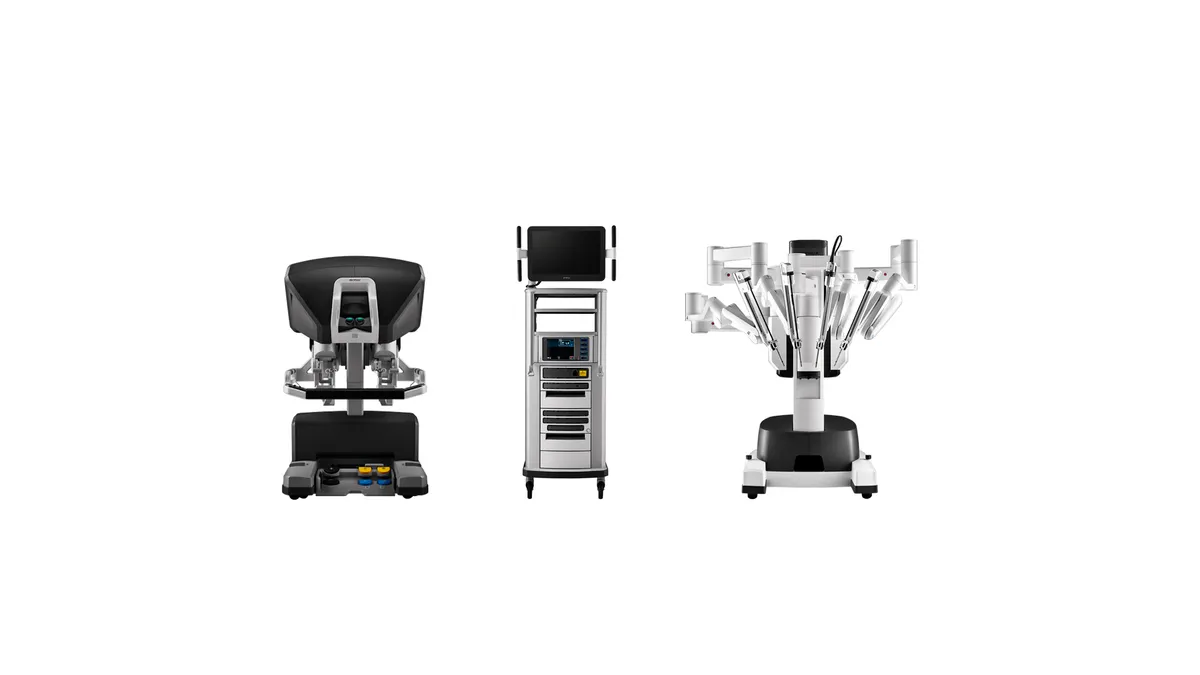Dive Brief:
- Intuitive Surgical said increased burdens on hospitals due to the resurgence of COVID-19 pressured demand for surgeries in the third quarter, tempering a recovery in procedures performed with its da Vinci robot. Worldwide da Vinci procedures increased about 20% in the quarter, compared to the year-ago period, and were down 3% from the second quarter.
- The company trimmed the high end of its forecast range for full-year procedure growth as a result. It now expects a gain of 27% to 29% in da Vinci procedure this year, compared to 27% to 30% forecast previously. Executives on the third-quarter call also warned of potential production cost increases due to supply chain challenges, but said those risks are not included in the 2021 forecast.
- Intuitive surprised the market Tuesday by releasing its results ahead of the close of stock trading. Evercore ISI analysts said the action followed an early release of Intuitive revenue figures on a wire service. Intuitive's shares closed 1.2% higher at $336.30.
Dive Insight:
The medtech sector has been bracing for a pullback in elective procedures in the third quarter because of the rise of COVID-19 delta variant. Intuitive's rebound from the pandemic's blow to non-emergency care in 2020 was picking up steam in the second quarter, enough so that the company felt comfortable bumping up its procedure outlook.
Now, Intuitive say the virus is stressing some hospitals and reducing demand for surgeries, at least in the third quarter. CEO Gary Guthart said U.S. procedures were below expectations at the start of the quarter and particularly in August, but stabilized in the final weeks of September.
The surge in COVID-19 cases weighed on U.S. procedure growth in the South and Southeast especially, and notably in states with lower vaccination rates, company executives said. Overall, the U.S. da Vinci procedure growth rate was 16% in the third quarter.
Hospitals have learned to better manage increased COVID-19 patient hospitalizations, but going forward, staffing shortages and supply chain issues could delay some procedures, including those performed with da Vinci robots, Intuitive CFO Marshall Mohr said on the call.
Another concern, said Mohr, is the potential for higher component costs and freight expedition fees, as global shortages threaten to cause supply chain disruptions. Intuitive employees are spending "significant time and effort" to procure supplies of semiconductors and other materials made more scarce by the pandemic, the CFO said.
The robotic surgery market leader reported third-quarter revenue rose 30% to $1.4 billion. Net income was $381 million, or $1.04 per share, compared with $314 million, or 87 cents a share, a year ago, driven by strength in bariatric, gallbladder removal and hernia repair procedures. Prostate removal procedures exceeded historical averages, and the hysterectomy category saw low-single-digit growth.
Intuitive said system placements remained "robust," especially in the U.S., with both new and existing hospital customers making capital purchases. The company shipped 336 da Vinci robots in the quarter, up 72% from a year ago, and its installed base climbed 11% to 6,525 systems.
Evercore ISI analysts said Intuitive's system placements helped the company beat Wall Street's revenue expectations in the quarter, but the decline in procedures from the second quarter stands in contrast to healthier surgery trends reported Tuesday by Johnson & Johnson. J&J's medical device business saw an 8% boost in sales in the third quarter.
Mohr also acknowledged looming competition on the horizon, stating on the call that as rival robots enter its markets, "we will likely experience longer selling cycles and price pressure."
Medtronic last week announced its Hugo surgical robot gained CE mark approval in Europe for gynecological and urological procedures. However, J&J on Tuesday said it was delaying the rollout of its Ottava soft tissue robot system, meant to challenge Intuitive's dominance, by two years due to technical and supply chain challenges.
Guthart also announced several changes to Intuitive's executive team, effective Jan. 1, 2022, intended to boost growth in the company's product lines. Mohr was named executive vice president for global business services, overseeing information technology, enterprise process, data and systems, and global facilities. Jamie Samath will succeed Mohr as CFO.
Dave Rosa, currently executive vice president and chief business officer, was appointed to the role of executive vice president and chief strategy and growth officer. Henry Charlton, currently general manager of U.S. and Europe, will succeed Rosa as chief commercial officer.











